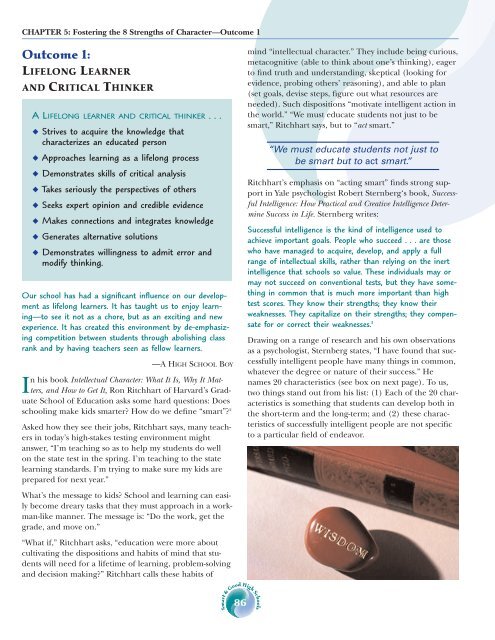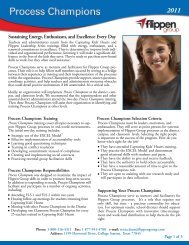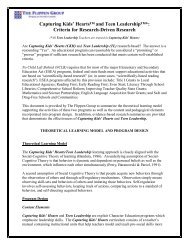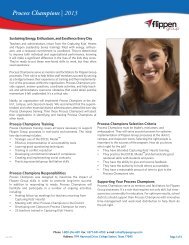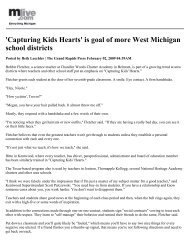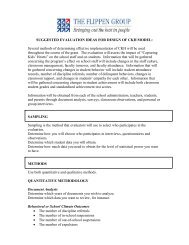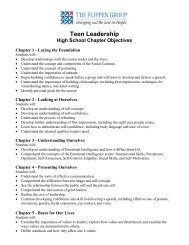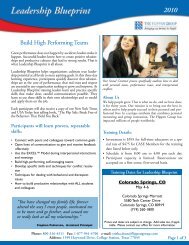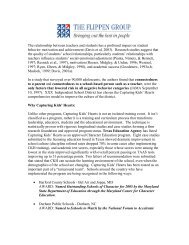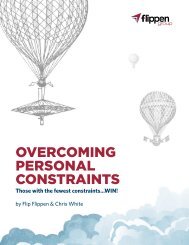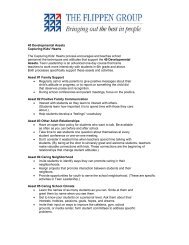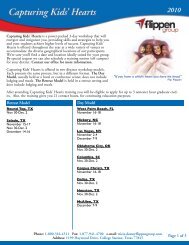Smart & Good High Schools - The Flippen Group
Smart & Good High Schools - The Flippen Group
Smart & Good High Schools - The Flippen Group
- No tags were found...
You also want an ePaper? Increase the reach of your titles
YUMPU automatically turns print PDFs into web optimized ePapers that Google loves.
CHAPTER 5: Fostering the 8 Strengths of Character—Outcome 1Outcome 1:LIFELONG LEARNERAND CRITICAL THINKERA LIFELONG LEARNER AND CRITICAL THINKER . . .◆ Strives to acquire the knowledge thatcharacterizes an educated person◆ Approaches learning as a lifelong process◆ Demonstrates skills of critical analysis◆ Takes seriously the perspectives of others◆ Seeks expert opinion and credible evidence◆ Makes connections and integrates knowledge◆ Generates alternative solutions◆ Demonstrates willingness to admit error andmodify thinking.Our school has had a significant influence on our developmentas lifelong learners. It has taught us to enjoy learning—tosee it not as a chore, but as an exciting and newexperience. It has created this environment by de-emphasizingcompetition between students through abolishing classrank and by having teachers seen as fellow learners.—A HIGH SCHOOL BOYIn his book Intellectual Character: What It Is, Why It Matters,and How to Get It, Ron Ritchhart of Harvard’s GraduateSchool of Education asks some hard questions: Doesschooling make kids smarter? How do we define “smart”? 2Asked how they see their jobs, Ritchhart says, many teachersin today’s high-stakes testing environment mightanswer, “I’m teaching so as to help my students do wellon the state test in the spring. I’m teaching to the statelearning standards. I’m trying to make sure my kids areprepared for next year.”What’s the message to kids? School and learning can easilybecome dreary tasks that they must approach in a workman-likemanner. <strong>The</strong> message is: “Do the work, get thegrade, and move on.”“What if,” Ritchhart asks, “education were more aboutcultivating the dispositions and habits of mind that studentswill need for a lifetime of learning, problem-solvingand decision making?” Ritchhart calls these habits ofmind “intellectual character.” <strong>The</strong>y include being curious,metacognitive (able to think about one’s thinking), eagerto find truth and understanding, skeptical (looking forevidence, probing others’ reasoning), and able to plan(set goals, devise steps, figure out what resources areneeded). Such dispositions “motivate intelligent action inthe world.” “We must educate students not just to besmart,” Ritchhart says, but to “act smart.”“We must educate students not just tobe smart but to act smart.”Ritchhart’s emphasis on “acting smart” finds strong supportin Yale psychologist Robert Sternberg‘s book, SuccessfulIntelligence: How Practical and Creative Intelligence DetermineSuccess in Life. Sternberg writes:Successful intelligence is the kind of intelligence used toachieve important goals. People who succeed . . . are thosewho have managed to acquire, develop, and apply a fullrange of intellectual skills, rather than relying on the inertintelligence that schools so value. <strong>The</strong>se individuals may ormay not succeed on conventional tests, but they have somethingin common that is much more important than hightest scores. <strong>The</strong>y know their strengths; they know theirweaknesses. <strong>The</strong>y capitalize on their strengths; they compensatefor or correct their weaknesses. 3Drawing on a range of research and his own observationsas a psychologist, Sternberg states, “I have found that successfullyintelligent people have many things in common,whatever the degree or nature of their success.” Henames 20 characteristics (see box on next page). To us,two things stand out from his list: (1) Each of the 20 characteristicsis something that students can develop both inthe short-term and the long-term; and (2) these characteristicsof successfully intelligent people are not specificto a particular field of endeavor.86<strong>Smart</strong> & <strong>Good</strong> <strong>High</strong> <strong>Schools</strong>


